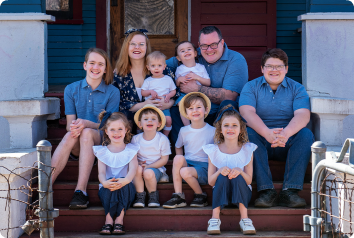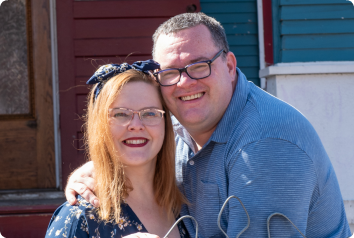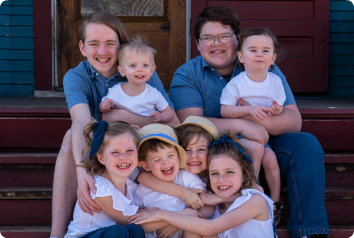 Just after a judge declared the adoption of their two sons was official, Britni and Karl Lane took a photograph to celebrate and record the significant moment. The parents and the two boys, 3-year-old Oliver and 2-year-old Sullivan, are bundled up in coats and showing off big smiles. There’s neither a judge nor a courtroom to be seen.
Just after a judge declared the adoption of their two sons was official, Britni and Karl Lane took a photograph to celebrate and record the significant moment. The parents and the two boys, 3-year-old Oliver and 2-year-old Sullivan, are bundled up in coats and showing off big smiles. There’s neither a judge nor a courtroom to be seen.
That’s because the Lanes were on their front porch with Oliver and Sullivan, communicating with a judge via a cell phone.
“The judge asked us if we wanted to be Oliver’s and Sullivan’s parents forever,” said Britni. “We raised our right hands and said, ‘Yes!'”
This is what adoption looks like in a time when a pandemic has forced justice systems to eliminate all but essential court appearances. For the Lanes, that meant doing the adoption paperwork by mail and taking the final legal step from their porch.

“We were asked if we were okay doing the adoption virtually,” said Britni. “We were just ready for our boys to be ours forever.”
After the ceremony, Oliver and Sullivan walked back into the house that already felt like home. They had been living with the Lanes as their foster parents for several months, surrounded by plenty of siblings: Douglas (15), Dominyck (14), Natalie (9), Willow (8), Lincoln (6) and Maxwell (2).
Britni says going from a family of six children to eight has been an easy transition. “Our entire routine was already disrupted because of COVID. We just rolled with it!”
demonstrating love through simple things
Britni and Karl knew they wanted to be foster parents. Karl moved to a foster home when he was 16 years old. He remembers the transition as “terrifying,” but quickly settled into the comfort of a family whose love was demonstrated in simple things.

“There was never anything I could do that would upset them,” said Karl. “My foster parents showed me another way: love. It made such a difference in my life.”
Both Karl and Britni have experienced challenges in their lives they worried it would hold them back in the eyes of foster care evaluators. They were surprised their backgrounds were viewed as a strength.
“That support made the process of becoming certified foster parents better that we could imagine,” said Karl. “You don’t have to be perfect – you just have to bring who you are and be ready to love.”


